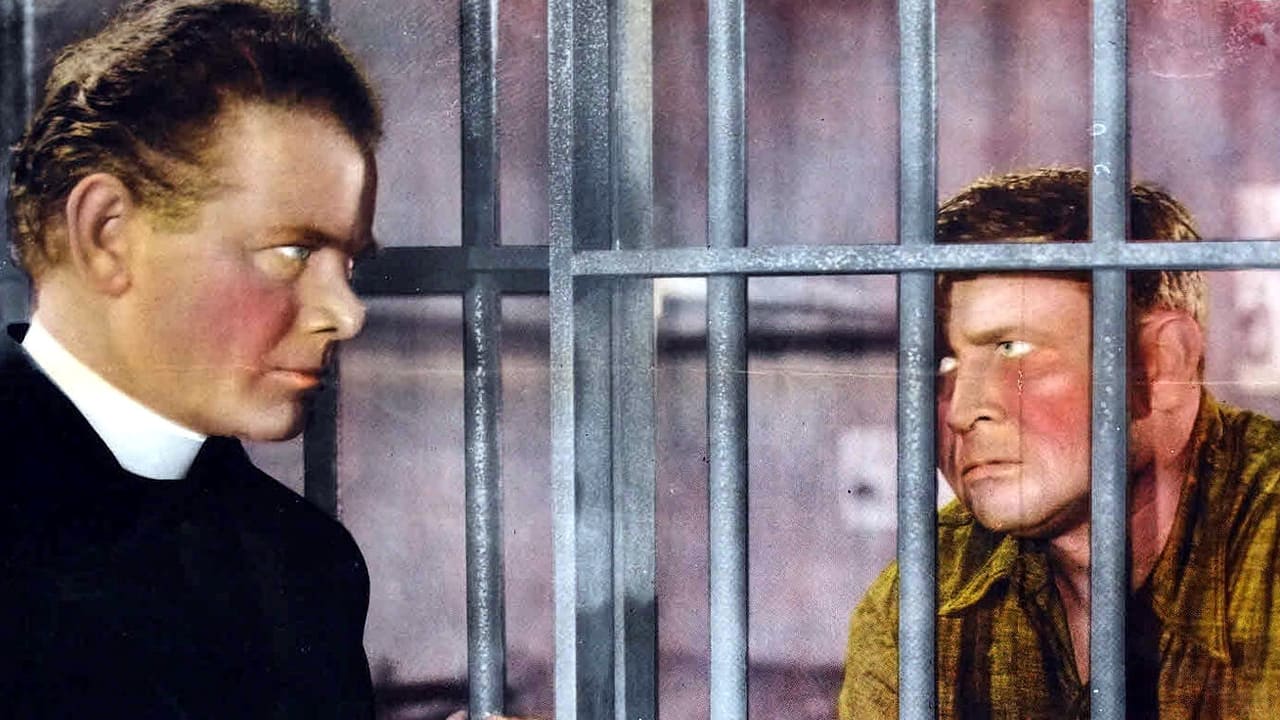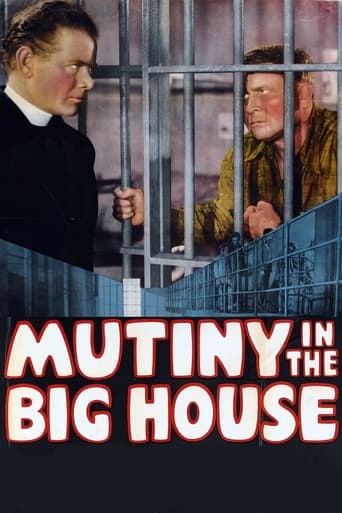

Best movie of this year hands down!
... View MorePurely Joyful Movie!
... View MoreExcellent, a Must See
... View MoreFanciful, disturbing, and wildly original, it announces the arrival of a fresh, bold voice in American cinema.
... View MoreThere is a haunting scene here where a prisoner on death row getting ready to go to the gallows breaks down in the arms of priest Charles Bickford, revealing his fear and being unsure how to pray. He admits that he was guilty of murdering his wife out of jealousy, but in that last moment of anger after her death, tried to call her back but couldn't. I've heard ministers say that even at the moment of death, somebody with the greatest sins on their soul can come to Christ and be forgiven and atoned. This movie may be schmaltzy in many ways, but it also opens up the opportunity for discussion on the issue of salvation. It wasn't just a fear of going to hell in this man's heart, but his regret for a human emotion he had no control over, and one which ruined his life. Bickford, playing a man of God who was once a child of the streets, has a gruff exterior, but his heart is big, especially as he deals with the troubled inmates of a very rough prison where a new warden turns everything upside down, leading to a very violent riot. This Monogram film is about two reels longer than most of their films, with great detail put into the individual characterizations, and crafty in how it develops the events leading up to this mutiny. The aggressor in that mutiny is inmate Barton MacLane who senses the fear and innocence of a new young inmate (Dennis Moore) and cleverly uses him as a key into events which will lead up to this riot and attempt to escape. Bickford, sensing that MacLane is up to no good in regards to Moore, refuses to help him to get a job in the prison library, and MacLane becomes resentful towards him because of that. Bickford also aids the aging inmate George Cleveland who has been in prison for years and unable to deal with the life that he finds when he is freed. Little aspects like this makes "Mutiny in the Big House" an above average second feature, partially based upon alleged real events and people, and not at all cloying or overly preachy. Bickford and MacLane, practically interchangeable in their gruff personalities, are excellent in their roles, and the conclusion is thrilling, reminding me of the stand-off at the tail end of "High Noon".
... View MoreBetter than you might expect from a Monogram production, "Mutiny in the Big House" has a really involving script by Robert Hardy Andrews (based on an original story by Martin Mooney that was itself based on true events) that gains much from the sincere portrayals by the principals, particularly Charles Bickford as Father Joe and Barton MacLane as Red. Even William Nigh's direction has unusual vigor and the film's budget is more expansive than the usual Monogram effort. True, there are stock shots, but they are integrated with more skill than usual. It's obvious that someone's heart (presumably producer Grant Withers – this was one of six films the prolific actor produced for Monogram) – was in this one!
... View MoreAlthough some of the scenes have some real poignancy to them in the end Mutiny In The Big House ends up a melodramatic mess with every prison cliché in the book thrown into the plot.The two leads and two opposite poles of good and evil are Charles Bickford as the prison chaplain and Barton MacLane as the toughest con in the joint. Parts that both are well cast in, especially MacLane.The main part of the story line involves young Dennis Moore sent to prison for forging a $10.00 check for his mother's medicine. Sounds like he didn't have a good lawyer if indeed it was his first offense. Over Bickford's objections Moore is assigned as cell-mate to MacLane who tries to wise him up in prison ways. Bickford of course sees something redeemable in Moore and the conflict begins.Best scenes are with old time institutionalized con George Cleveland. When he's released he can't adjust to life on the outside. Long before James Whitmore perfected the part in Shawshank Redemption, Cleveland gives a touching performance and Bickford actually goes to bat for him to get him sent back to prison.The climax includes a prison break and what normally happens, happens in Mutiny In The Big House. Charles Bickford was in a much better prison film Brute Force and a lot of these same situations were handled better in that classic film.You can't pass up a film with Bickford and MacLane in classic parts, but don't expect all that much from Mutiny In The Big House.
... View MoreAn original story by Martin Mooney based on a true story & a tribute to prison chaplain Father Patrick O'Neil who risked his life to save innocent men in the Canon City Colorado prison riot in October 3rd 1929. In which 7 guards & 5 prison inmates were killed. And was awarded the Carnegie Medal for his extraordinary heroic act. As the heading reads after the opening credits & also states it's a fictionalized story for the movie.The prison chaplain is Father Joe Collins convincingly portrayed by Charles Bickford. Dennis Moore plays Johnny Gates sent to prison for 14 years for forging a bad check for 10 bucks because of hard times. Father Joe thinks Johnny got a raw deal & is a decent man & doesn't deserve the harsh sentence he received & tries to encourage him not to be corrupted by bad cell mates. He gets put into a cell with the prison big shot Red Manson played by Barton MacLane who specialized in playing bad guys & gangsters & is planning a prison break. Usually in supporting roles but occasionally in leading roles such as "Prison Break" (1938) & "Captain Scarface" (1953). Here he's top billed with Charles Bickford. This low budget film is quite well done & it's quality is evident & it has a good solid cast giving very effective performances. Prison movies of the 30's showed how grim & harsh & depressing prison life can be like the inmate on death row in his last hour before walking his last mile to be hanged. And there was usually singing inmates like Singing Jim (Richard Austin) who hauntingly sings nonstop. The message is very clear being in prison is hell. Charley Foy is also one of the inmates in charge of the prison show which the warden pulls the plug on for suspecting a break will take place. He gives a great tap dance act with his clicking heels & snapping fingers. The film also shows what happens to old timers like Convict "Dad" Schultz (George Cleveland) that are institutionalized & after being released & returning to the outside world with no direction & nothing to look forward to & cannot adjust to society & become insane & committed to a mental hospital only to want to be sent back to the big house because prison has sadly become his "home". After the prison show is canceled the audience has no clue as to how the crash out will be staged & where. We are kept in the dark not knowing when & where & how only we know it'll happen. Which was typical in 1930's prison flicks. Leaving the viewer in suspense so when it does go down BANG ! You're in for a ride leading to an explosive climax. Worth watching if you like prison movies. A nice discovery & a hidden treasure !
... View More